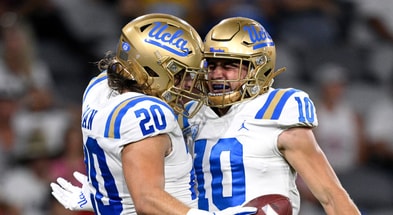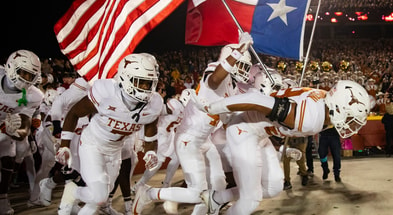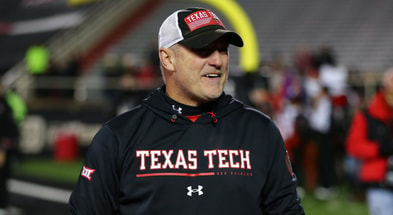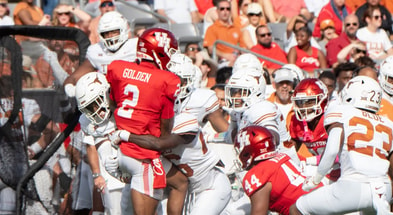Pros and Cons of a Big 12 Championship Game

For better or worse, the results of this week’s meetings among the presidents and athletic directors of the Big 12 are in: nay on a conference network; nay on conference expansion. Those with a close eye on this deal knew that to be the likely outcome all along (regardless of what they may have privately hoped simply for the fun of it, if nothing else).
You’ll remember OU’s President David Boren being most outspoken about necessary conference changes. I suppose, he’s changed his mind. Boren was quoted this week on expansion saying, “our fans don’t want to see us playing mediocre teams.” Concerning a Big 12 network, which would effectively mean the end of LHN, Boren said the marketplace “made that decision for us. … That ship has sailed.”
It’s true “cord-cutters” are causing all cable networks to rethink their strategy. I was surprised how one week of meetings genuinely caused Oklahoma’s President to rethink his. This one from Boren, to me, says it all: “We are in a position of strength. We’re not in any kind of crisis where we have to decide something very quickly.”
Why is President Boren singing a different tune? My guess: the Big 12 learned its annual income increased 20% in a single year, its total income an impressive $304 million. That’s 30 million reasons to be content distributed to each one of the Big 12’s schools. While the league admittedly knows their revenue will still be behind the SEC and Big 10, the bottom line’s dramatic increase from the previous year would make any school president smile.
The big wigs’ decisions weren’t all negatory. They ruled “yay” on two things, at least:
1. Baker Mayfield gets an extra year of eligibility.
2. Conference championship game comes back in 2017.
The first caused a corporate groan to be heard among all in the Big 12 except Sooner fans, but I think it was the right call. Give Baker back his eligibility. He deserves it. The second was much more intriguing to me, as the Big 12 Championship game stirs feelings and memories I have from years past. Below are the pros and cons of reinstating the Big 12 championship game — I’ll give you the bad news first.
CONS
1. It’s Illogical
Having a Big 12 title game is illogical if the conference keeps its round-robin format. The point of a round-robin schedule is the winner is clearly decided on the field; thus, negating the reason to have a championship game. This is where the Big 12’s “One True Champion” slogan came from — no other Power 5 conference has the ability for each team to play head-to-head during the season.
The current plan is to divide the conference into two divisions of five, as commissioner Bob Bowlsby said earlier this week. Dividing the conference won’t change the fact that the championship game will be a rematch no matter what teams get there. The round-robin schedule then (which is supposed to make the Big 12 unique) makes its own championship game redundant, unnecessary, and useless.
But, Big 12 Commissioner Bowlsby doesn’t see things that way:
“If we’re playing a full round robin and a championship game our means of determining a champion is the strongest of all conferences. It puts us in a very good position.”
2. Upset Potential
Navigate Research (an independent analytics firm the league hired) reported expanding to 12 teams with two divisions, playing an 8-game conference schedule, and adding a championship game could increase the Big 12’s playoff hopes by 14%. The point of adding a conference championship game is making sure the Big 12 gets into the College Football Playoff. Unlike other conferences, however, the Big 12 championship game has been won by the underdog all too often with national title hopes on the line.
With the ’96 Nebraska, ’98 Kansas State, ’01 Texas, and ’07 Missouri teams: all four left the conference championship game with their dreams of playing for the big one ruined. In the BCS era, the Big 12 championship game was more of a hindrance to the conference than a help — it arguably kept it’s own league out of a national championship 4x in 15 years. Things may be different now in the era of the Playoff, but only if the Big 12’s upset trend in the championship game has changed.
Boren is convinced a “13th data point” will help:
“The presentations by our consultants on the value of the championship game in terms of providing a 13th data point to help us have a better chance of getting into football playoffs…was very, very convincing.”
PROS
1. Money
Money seems to be the biggest reason for doing anything in college sports. Hey, what can I say? College football is a business and in business “money talks.” This is the most logical reason for adding a championship game of them all, and the conference’s big dogs are well aware. I think money was the main reason adding a title match was unanimously approved; having a larger bank account is one of the few things every school can agree on.
Top 10
- 1New
Baseball Top 25 projection
Massive Top 10 shakeup
- 2Hot
Shedeur Sanders prank
Son of NFL DC admits guilt, apologizes
- 3
Falcons release statement
Involvement of DC in Sanders prank
- 4Trending
Jalen Milroe warns
Teams that passed on him
- 5
Tyler Warren pranked
Tied to Shedeur Sanders call
Get the On3 Top 10 to your inbox every morning
By clicking "Subscribe to Newsletter", I agree to On3's Privacy Notice, Terms, and use of my personal information described therein.
By adding a championship game, the Big 12 will make close to $30 million more a year. Think about it: one game, for an extra $30 million toward the conference. It’s not hard to understand now why the game being redundant doesn’t matter so much. Each school in the Big 12 stands to make an extra 2-3 million dollars because of the “13th data point.”
Note: the Big 12 Championship will alternate being televised on Fox and ESPN — Fox on the odd years (starting in 2017) and ESPN on the even years (starting in 2018).
2. Like Everyone Else
There’s something to be said for being like every other kid on the block. I can’t deny while watching Championship Week in 2015, I thought, “I wish the Big 12 was playing, too.” It felt like the Big 12 was on the outside looking in, even though Oklahoma was a solid candidate and near shoe-in for the Playoff. The SEC, Big 10, ACC, and Pac 12 all had the spotlight. The Big 12 was the lone Power 5 conference not playing a game that weekend.
It probably hurt Mayfield in terms of Heisman votes. While Christian McCaffrey was captivating the country, Baker was probably at home watching TV in Norman. Playing well on that kind of stage allows athletes a greater chance for individual awards; Baker didn’t get invited to NYC, as you know. But even more than Heisman hopefuls, not playing during Championship Week could put the Big 12 at a disadvantage in terms of impressing the Playoff Committee (as happened in 2014). This is where the “13th data point” comes into play.
Boren encapsulated this line of thinking perfectly:
“”Let’s just say that, reputationally, having that 13th data point is very helpful in terms of our competitive position, also very helpful in terms of our financial position and increasing our revenue distribution per school.” Translation: we’ll be just like all the other guys, and the money ain’t bad either.
3. Attention
If making the College Football Playoff hinges on one game at the end of the season, people will watch. Even if it’s a rematch from earlier in the year fans will tune in because the game matters. In 2001, I remember trembling with excitement as the Longhorns took on Colorado in Texas Stadium. It was the Big 12 Championship and Texas had waxed the Buffaloes 41-7 five weeks earlier that season. If the Horns won, they’d waltz right into an unexpected national championship game with the Miami Hurricanes at the Rose Bowl — but it never happened.
You know the story, four turnovers from Simms and an Applewhite comeback that barely came up short. My point is not the missed opportunity for the Longhorns; my point is the whole nation was tuned in. Playing big games with national implications at the end of the season will capture fans of college football. The Big 12 loses out as a whole if its teams aren’t alongside other conferences to be watched.
Personally, I was completely against the idea of the Big 12 adding a championship game. But now that they have, I’m glad they did simply because it means there will be more college football to watch. Football season is always long for players and short for fans. I say bring on September.



























